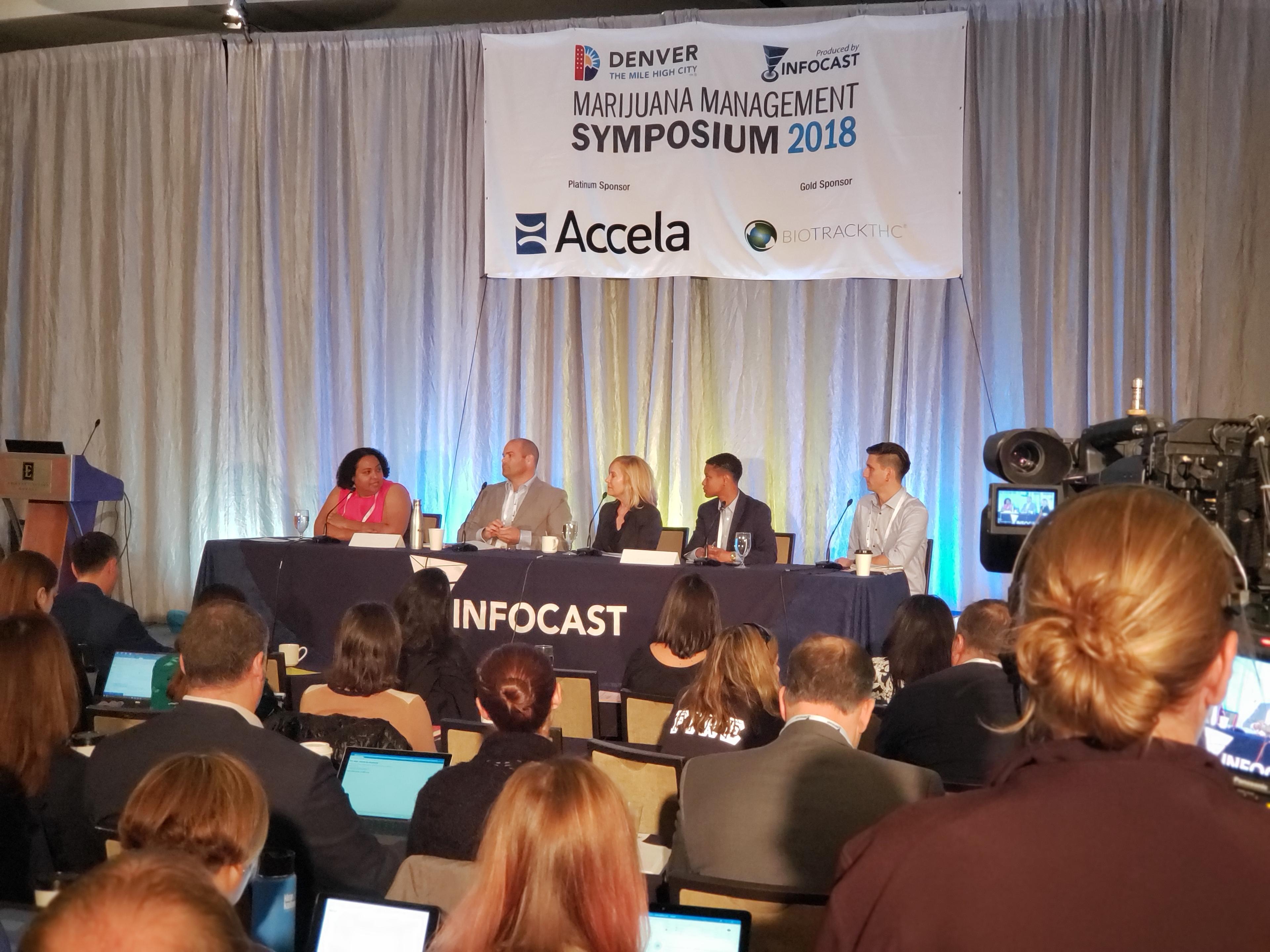Is Denver the hub of the marijuana universe? Culturally speaking, that’s arguable, but in terms of regulatory practices, all signs point towards Denver as being the leader of the pack.
If you happen to be a regulatory body looking for a blueprint for how to implement legal, regulated marijuana, Denver might just provide you with the framework you need. In fact, just this year, the state has generated $1.5 billion in sales and Denver alone accounted for over 37 percent of those sales.
Not only has that produced a substantial amount of tax revenue for the city, according to Mayor Michael Hancock, the industry has been cooperative in terms of using their success to address the needs of the city. Much of that tax revenue has been spent on public services and recently the industry agreed to a slight tax increase in order to help the city fund affordable housing projects.
The city kicked off the 2018 Marijuana Management Symposium at the downtown Embassy Suites on Thursday. It’s an annual event in which stakeholders in the industry from around the world get together to discuss best practices for implementing regulatory policies regarding cannabis. This event brings out some of the biggest players in the industry to be part of the conversation concerning legalizing marijuana.
Recently, our neighbors to the north in Canada have legalized the substance on a federal level and it appears our neighbors to the south in Mexico are headed that same direction. On top of that, throughout the United States, many municipalities are wrestling with how to take their next steps going forward so they can do what Denver did a whole five years ago.
Hancock has called the Denver cannabis journey largely successful.
He has also wrangled a cohort of mayors from across the country to push for “sensible regulation” at the federal level to make it easier for other cities to follow suit.
"With all the knowledge that we have, experience that we have, wisdom that we've learned, this now needs to be used at the national level from my standpoint," he said.
"That's why the mayors' coalition is so important for us because we now need to make sure we're pushing for those same kind of commonsensical regulations at the federal level to allow this industry to do what's appropriate on the local and state levels."
One challenge Denver has learned from: data collection.
Answering a question from an out-of-state regulator about how a state should begin implementing legalized marijuana, Michael Hartman, the executive director of the Colorado Department of Revenue, said to collect as much data as possible, as often as possible. He stressed how important that process is and how valuable it will be later as the public and officials audit the successes and failures of legal marijuana. That type of data collection is not easy and requires a sustained amount of collaboration from stakeholders who would be privy to that information.
That's also an area where Denver had at least one major issue: At one point, consumers were able to abuse the system and purchase well beyond the ounce a day that was stipulated by law. The police raid and subsequent shutdown of a cannabis company, Sweet Leaf, was a casualty of this lack of communication within the system.
Lack of federal compliance puts local governments in a tough position as it becomes hard for a billion-dollar industry to do things like banking, and spending money for the public good in exchange for the tax write-off. This also puts local lawmakers in the very tough position of working in the blind as they are not simply working under a federal framework to implement the will of their local communities — they are creating the entire framework independently.
That's one of the reasons this symposium has become so popular, according to BioTrackTHC CEO Patrick Vo. He says it gives regulatory bodies and opportunity to get together and learn from one another.
"For regulators in states or countries that are currently trying to figure how to implement their cannabis programs this is where they come to learn," Vo said.
Some of the major concerns around legal cannabis include increases in crime and morality issues as well as infrastructure concerns.
According to the Department of Excise and Licenses, marijuana crime has only made up 2 percent of total crime so that hasn't been much of a concern.
Although it hasn’t happened perfectly, Denver has addressed many of the concerns. Denver's success has even won over leadership in the city in the state like Hancock and Gov. John Hickenlooper, who were both originally opponents of legalization. In fact, according to a recent article published by CNN, Hickenlooper still isn't sold on the idea that legalized cannabis is the right answer for the state.
But upon visiting the state, dissenters don't encounter hoards of teenagers committing crimes and smoking marijuana profusely in the streets.
Kilroy also said that simply banning marijuana does not make its existence go away and if you can usher those users into a legitimate system, it’s a win for everybody involved. As she jokingly mentioned ,it is good to have dispensaries for the same reason "we don't go buy gin from our neighbors bathtub anymore."

"Revenue is up, crime is relatively stable, and we have not seen a huge increase in youth usage thank goodness," Ashley Kilroy, executive director of Excise and Licenses, said during a panel.
She noted that consumption amongst youth has been essentially stable had actually taken a very subtle dip according to the latest official Healthy Kids survey the state had taken.
One of the biggest challenges is reconciling the past with the present.
Over the last several years, the nation has started to face the consequences of the war on drugs for communities of color. In the case of marijuana alone, while white and black folks have historically used at the same rate, black folks have been arrested for the substance at more than 3 times the rate of their white peers, according to the ACLU. Although there have been some efforts throughout the country to expunge those records and create a pathway for entrance into the now massive marijuana industry for those who were formerly incarcerated, providing equity in the wake of these legal changes has been a regulatory conundrum.
Kilroy said during a panel regarding the national state of marijuana that the mayor has given the go-ahead to work towards expunging the records of those who have low level marijuana offenses. She also said that the city is looking to funnel some of the revenue it has received from the industry into the communities that were most disproportionately affected by the war on drugs.
Beyond that problem, Hancock said that regulatory bodies must find ways to incorporate people that don’t already have access to tremendous accounts of capital and networking opportunities into the industry.
“This is still pretty much a homogenous industry, we've got to find a way to open the doors for other folks who might be interested in entering this industry to do so. Women, minorities are not in this industry and as you've seen in Colorado we had $1.5 billion worth of sales we must find a way for those folks to engage in this,” Hancock said.
Currently, the way almost all of the industries are set up, without a ton of available cash there are not many entry points that don't involve being a budtender or a low-level employee. This obviously skews heavily towards big business and does little to reconcile the harm done to those were incarcerated for setting up marijuana enterprises that were then illegal.
Hancock says he wants to keep Denver on the front end of the conversation and that will happen if the city remains opens to new ideas and continues to challenge itself in ways that make the industry better for everyone. At the most local of levels, the city is still struggling with implementing places for people to smoke and keeping bad actors from misusing home grows but overall it’s safe to say Denver stands out regarding how the substance should be handled.












